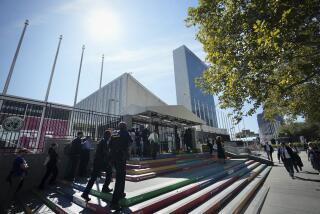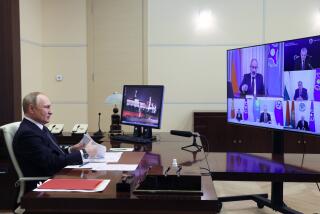Gorbachev May Meet Reagan During U.N. Meeting, Pravda Editor Says
- Share via
MOSCOW — Soviet leader Mikhail S. Gorbachev will go to New York for the U.N. General Assembly meeting opening in September and may see President Reagan at that time, the editor of Pravda said Monday.
Viktor G. Afanasiyev, editor in chief of the official Communist Party newspaper, made the statements in an interview with Reuters news agency. His remarks were the first confirmation that Gorbachev will address the General Assembly and might possibly confer with the President while in the United States.
In Washington, the State Department said it has “not received any official notification” of Gorbachev’s plans to attend the U.N. session and that “no arrangements have been made for the (Soviet) general secretary and the President to meet.”
Said one U.S. official privately, “This is more concrete than anything we’ve seen before, but it does not reflect anything that’s been going on in official channels.”
Administration officials said that the official situation remains that a Reagan-Gorbachev meeting has been agreed to in principle, leaving it up to Moscow to propose a time and place. The view among U.S. officials was that the Soviets may now be suggesting a meeting place to get a U.S. reaction.
Gorbachev to Speak Today
Gorbachev may shed more light on the matter when he addresses a meeting of the Central Committee of the Communist Party expected to begin today.
“I know for sure that Mr. Gorbachev will go to the General Assembly session,” said Pravda’s Afanasiyev, who has broken other news to Western reporters in the past, such as the acknowledgement that the late Soviet President Konstantin U. Chernenko was ill. “My personal view is that this meeting (with Reagan) will take place during the U.N. General Assembly session.”
Afanasiyev and Soviet Foreign Ministry spokesman Vladimir B. Lomeiko indicated that a Soviet-American summit would be expected to produce agreement on some disputes.
“It’s nonsense to talk about just meeting,” Afanasiyev said, responding to American suggestions that perhaps Reagan and Gorbachev might hold a simple get-acquainted session. “Some agreements should be signed. Compromises can be worked out.”
Lomeiko, speaking to a group of visiting American reporters, said Reagan’s invitation to Gorbachev for a personal meeting “was not accepted, but that doesn’t mean it was rejected.”
Need for Preparations
A Reagan-Gorbachev session, Lomeiko added, “should be seriously prepared, and the time and the character will depend on the political situation and the attitude of the American Administration.”
The Administration believes no agreement needs to be signed during a get-acquainted meeting, although any agreement arising from ongoing negotiations could be signed then. Still, even the U.S. officials seem to agree that a substantive meeting is called for.
“Things have gone too far now to have just a handshake summit,” one U.S. official said. While Soviet-American arms control differences remain too great to reconcile this year, he added, negotiations on bilateral matters, such as the opening of new consulates in Kiev and New York, might be ready for signing at a “semi-summit.”
Secretary of State George P. Shultz has said he will discuss summit prospects when he meets Foreign Minister Andrei A. Gromyko in Vienna next month.
Soviet spokesman Lomeiko said the quick White House dismissal of Gorbachev’s announcement on April 7 that the Soviet Union was immediately suspending deployment of SS-20 missiles aimed at Western Europe was a negative factor. “To put it mildly, it doesn’t help,” he said.
The Administration rejected Gorbachev’s call for Washington to join the Soviets in the moratorium, saying it was a ploy that would leave the Soviets with a 10-to-1 advantage in nuclear warheads.
In Washington, Kenneth L. Adelman, director of the Arms Control and Disarmament Agency, said Monday that the Soviet Union is continuing construction of seven sites in Europe for its SS-20 missiles despite Gorbachev’s announcement of a freeze.
“It fits with previous Soviet moratoriums wherein they say they stop, but meanwhile the threat posed increases and increases,” the Associated Press quoted Adelman as saying.
Politburo member Geydar A. Aliyev also called on the United States to join in the moratorium and accused it of raising tensions in all parts of the world. Speaking at a Kremlin celebration of the 115th birthday of V.I. Lenin, founder of the Soviet state, Aliyev said the Soviet Union favors peaceful coexistence with capitalist states.
“We are convinced that by applying adequate mutual efforts, it is possible to achieve a turn for the better in the international situation and resume the process of establishing peaceful, mutually advantageous cooperation both in political and economic fields,” Aliyev said.
Aliyev, 61, the Communist Party leader in the Soviet republic of Azerbaijan, is expected to play a major role during Gorbachev’s tenure in the top Kremlin post. His hourlong speech before 6,000 senior party officials echoed Gorbachev’s call for increased discipline and anti-corruption campaigns against self-seeking party leaders.
More to Read
Sign up for Essential California
The most important California stories and recommendations in your inbox every morning.
You may occasionally receive promotional content from the Los Angeles Times.













